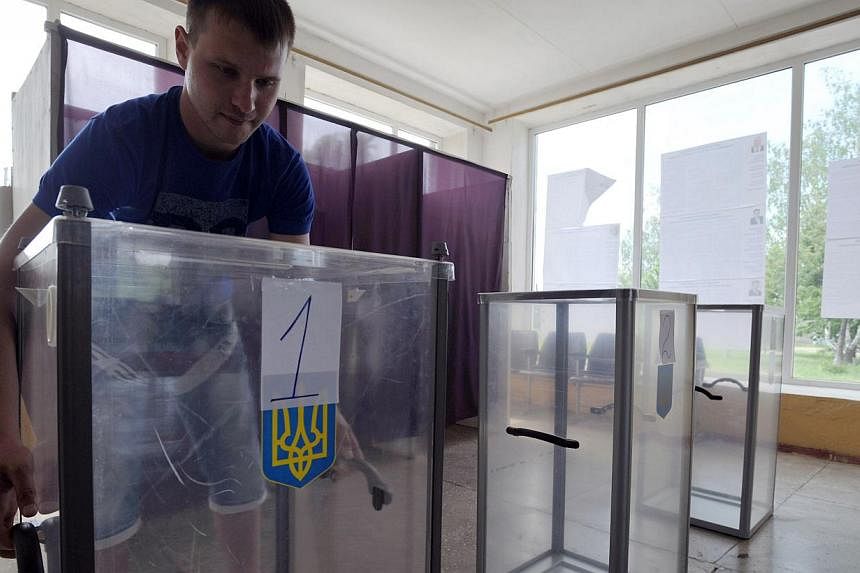KIEV (AFP) - Ukraine prepared Saturday for a presidential election seen as crucial to its very survival after months of turmoil that has driven the ex-Soviet country to the brink of civil war.
Sunday's vote comes with tensions running high after a bloody upsurge in fighting, with two Western photographers injured while covering the disturbances in the country's separatist east.
Prime Minister Arseniy Yatsenyuk issued an appeal for people to turn out to "defend Ukraine", which has been in deep crisis since street protests forced out the Kremlin-backed regime in February.
"This will be the expression of the will of Ukrainians from the west, east, north and south," he said.
But the rebels warned they would prevent voting in their strongholds in the industrial heartland on the Russian border.
"If necessary we will revert to the use of force," said Denis Pushilin, a leader of the self-declared Donetsk People's Republic.
State election officials also admitted that they will only be able to open two of the 12 commissions responsible for tabulating ballots in the neighbouring separatist province of Lugansk.
However, in what could be a significant move in Ukraine's bitter confrontation with its former masters in Moscow, Russian President Vladimir Putin said on Friday he would respect the outcome of the vote.
On Saturday, he also said that claims he was seeking to rebuild the Soviet empire were "absolutely untrue".
Mr Putin also held joint telephone talks with German Chancellor Angela Merkel and French President Francois Hollande, with the three leaders "expressing an interest in seeing that the presidential election in Ukraine was held in a peaceful and calm atmosphere," the Kremlin said.
Suspicions about Mr Putin's motives have soared since Moscow annexed the Black Sea peninsula of Crimea in March, inspiring Russian-speaking rebels to take up arms in the eastern rustbelt the following month.
"We will treat their choice with respect," Mr Putin said Friday, while blaming the West for sending the former Soviet state into a "full-scale civil war".
"We are today working with those people who control the government and after the election we will of course work with the newly elected authorities."
He also dismissed suggestions that the worst standoff between Russia and the West since the collapse of the Soviet Union could be described as a "new Cold War".
The days before the election have been blighted by a resurgence in deadly fighting between the Ukraine military and rebels who have declared independence in Donetsk and Lugansk.
On Saturday, two Western photographers were wounded along with their Russian translator while working near the frontline between separatist and Ukrainian forces just south of the rebel stronghold city of Slavyansk.
The men were hit in an attack moments after getting out of their car, one the victims said.
On Friday, seven people were killed outside the town of Donetsk, a day after 19 soldiers died in the heaviest loss for the Ukrainian military since the conflict erupted.
In all about 150 people have been killed in the east, according to an AFP tally based on UN and Ukrainian government figures.
Sunday's vote is seen as the most important since independence in 1991, with Ukraine not only battling to stay united but also to stave off threatened bankruptcy and fears Russia could cut off vital gas supplies.
Billionaire chocolate baron Petro Poroshenko is the favourite, enjoying a near 30-point lead over former prime minister Yulia Tymoshenko.
But opinion polls show that the vote is likely to go to a runoff on June 15, leaving the country in limbo for another three weeks.
The authorities are mobilising more than 75,000 police and volunteers to try to ensure security, alongside around 1,200 international observers.
"I want to assure our fellow countrymen in the Donetsk and Lugansk regions who will be prevented from coming to their polling stations by the war unleashed against Ukraine that the bandits have little time left to terrorise your regions," said Mr Yatsenyuk.
Voting officials have reported numerous cases of intimidation and attacks by rebels in the east on the eve of polling.
"We haven't seen anyone," said a janitor at one Donetsk school that should have been used as a polling station. "There are no voting lists, no papers, no ballot boxes, nothing."
Washington and its European allies, which see Russia's hand directing the insurgency, have threatened more sanctions if Moscow disrupts the vote, adding to punitive measures they imposed over Crimea.
Mr Putin brushed off the threats, saying sanctions will "boomerang" on the West, and some European nations are wary of the impact further measures against Moscow could have on their own economies.
However, in another move that could ease the standoff, Mr Putin this week ordered the withdrawal of some 40,000 troops whose presence along Ukraine's border was causing jitters particularly among former Soviet satellites.
The head of Russia's army said the pullback could take at least 20 days.
The United States responded with caution to Putin's election comments, with White House spokesman Jay Carney saying: "We would welcome an indication from Russia that they would accept the results of a free and fair and democratic election in Ukraine."
Ukrainian Foreign Minister Andriy Deshchytsya also said Putin's words needed to be followed by "specific actions".

